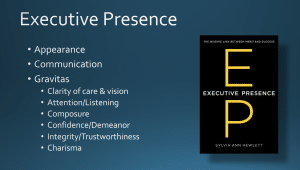
We know it when we see it. The person enters the room and you can tell they are special, they have an aura about them. This is someone you take seriously. They have influence. Because we recognize it, doesn’t mean we know how to generate it. What is it about these people that creates this aura?
We use the term executive presence to describe it. Now it has a name, I’m not sure it is better understood. For me, presence is all about our attention. As one of my coaches Bob Dunham often reminded me, ‘we are where our attention is’. This is true but still doesn’t adequately describe what executive presence is.
What is executive presence?
To answer this question I turned to a book by Sylvia Ann Hewlett called Executive Presence. Sylvia is a writer and researcher, and her book is a very thorough examination of the topic. She describes three key elements of executive presence: Appearance, Communication and Gravitas.
Appearance is important at first. What they say about first impressions is true. Appearance allows you in the door (or not). I’ve written a lot about communication and as such, I won’t go into more detail here. In contrast, gravitas is new and deserves our attention. I was curious to understand the definition of gravitas, and it is related to seriousness. That doesn’t quite do it for me, and I found Sylvia’s characteristics to be much more illuminating.
The characteristics of executive presence
As shown in the graphic above, there is a lot involved. All are important but a few stand out for me:
Clarity of care and vision – when we are in tune with something that is very important to us, we are willing to take a stand for it. This is critical to generate executive presence. It says ‘I believe this is important, and you should to’. When it is absent, why should we care? To be most impactful, we must also be able to relate our care to those we are meeting with. A shared care is extremely powerful.
Composure – It is difficult to stay composed when we are under fire. We often get triggered into fight or flight. My tendency is flight meaning I will retreat or go into a defensive mode. If we are well prepared, we can mitigate this. I find it helpful to write down all the difficult questions I would ask me. From there I write down what I will say in response. I don’t always get them right, but having this preparation gives me confidence.
Integrity/trustworthiness – On the surface, this sounds straightforward. If you are not seen as trustworthy, it will be very hard to generate presence. Looking beyond this, it also means standing up for what you believe to be right. Even if that means you are unpopular or an island of one. If we bend under pressure to gain favor, we lose our credibility. I contrast, being willing to disagree with a reasoned argument why, builds credibility. I have learned in many things, there is no right or wrong, we see the world differently.
Do you agree with Sylvia? From your experience, what are some other key ingredients beneath executive presence?


